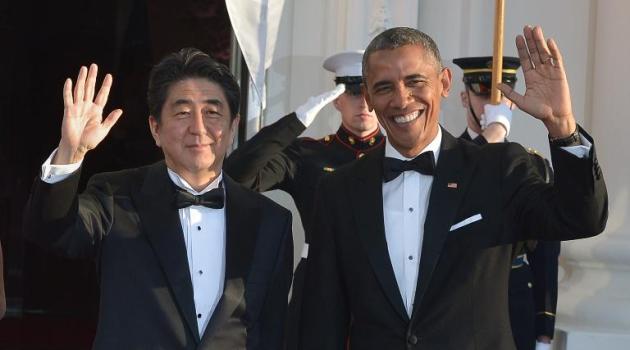
US President Barack Obama and Japanese Prime Minister Shinzo Abe at the White House on April 28, 2015/AFP
WASHINGTON, April 29- Shinzo Abe will become the first Japanese prime minister to address a joint session of the US Congress, expected Wednesday to bring a message of deepening economic and security ties in the face of China’s growing clout.
Few Japanese politicians have ever addressed Congress and none have done so in a coveted joint session of the Senate and House of Representatives.
Abe will do so in the crowning event of a week long US tour as the two former enemies prepare to mark the 70th anniversary of the end of World War II.
The 60-year-old Abe’s visit comes as Washington presses Japan to mend frayed ties with fellow US ally South Korea and with China. During the war Japan’s Asian neighbors suffered from Japanese militarism.
Beijing and Seoul will be closely watching what Abe says. South Korea has urged Abe to use the opportunity to express “sincere repentance” for wartime atrocities, while China’s foreign ministry has merely noted the reports of the US invitation.
Abe’s government has publicly endorsed a 1995 apology for wartime wrongs.
But South Korea is hoping he addresses Japan’s controversial emphasis on patriotism in schools, and ministers’ visits to a shrine that honors the war dead, including convicted war criminals.
Seoul believes Tokyo has yet to fully atone for the excesses of its colonial past and the forced recruitment of South Korean women to wartime military brothels.
– Friction worries Washington –
The friction between Seoul and Tokyo is an irritant for Washington, which would rather see its two key regional allies bury the hatchet and focus on forming a united front against an increasingly assertive China.
On Tuesday President Barack Obama welcomed Abe to the White House as the two countries sought to reinvigorate their 70 year alliance in the face of China’s growing influence.
The visit also comes amid intense negotiations over the US led Trans Pacific Partnership, a 12 nation free trade agreement including Japanese participation.
Abe and Obama pledged Tuesday to forge ahead with the Trans Pacific trade deal, which would encompass 40 percent of the world economy but exclude Beijing.
China has increasingly been making its economic prowess felt, pushing hard for the creation of an Asian Infrastructure Investment Bank to rival US backed institutions.
Obama denied that the United States opposed the bank, but said transparency was essential.
“What we don’t want to do is just be participating in something and providing cover for an institution that does not end up doing right by its people,” he said.
Voicing shared anxiety about China’s activities in the South and East China Seas, the two leaders vowed to counter new threats and increase joint military deterrence.
Obama accused China of “flexing their muscles” though territorial claims and the building of new islands in disputed waters.
“There are some real tensions that have arisen with China around its approach to maritime issues and its claims,” Obama said.
Many experts believe the oil-rich South China Sea — a mosaic of historical territorial claims — could be a flashpoint for conflict.
The US president reiterated his “absolute” commitment to Japan’s defense and stressed that the pledge “covers all territories under Japan’s administration, including Senkaku Islands.”
Beijing lays claim to the island chain in the East China Sea it calls the Diaoyus.
Now for the first time that US defense assurance will be reciprocated, thanks to a deal signed during Abe’s visit.
Japan’s well-trained and well-equipped forces will be able to come to the defense of the United States, a dramatically more assertive security role for the officially long-pacifist country.
But, Obama insisted, “we don’t think that a strong US-Japan alliance should be seen as a provocation.”
“We welcome China’s peaceful rise.”
– ‘Deeply pained’ –
The issue of wartime sex slavery is behind some US opposition to the invitation for Abe to address lawmakers.
Japan says it has already apologized, offered financial compensation and psychological help to victims.
Diplomatic sources have said Abe’s speech was expected to echo some of the themes from an address last July to the Australian parliament, where he expressed humility about the “evils and horrors” of Japan’s history.
During a joint press conference Tuesday, Abe expressed his remorse over the sexual slavery of Asian women during World War II in Japanese military brothels — a deeply emotive issue in China and South Korea — but stopped short of issuing his own apology.
“I am deeply pained to think about the ‘comfort women’ who experienced immeasurable pain and suffering as a result of victimization due to human trafficking,” Abe said.
Mainstream historians say an estimated 200,000 women from Korea, China and other Asian nations were systematically raped by Japan’s imperial forces.
Abe — who would like to move beyond Japan’s checkered past — has been under fierce pressure to repeat the apologies of his predecessors.
Some US lawmakers — many with large Korean American constituencies — have been highly vocal in their demands for an apology.
During the White House visit, Obama held Oval Office talks with Abe and offered a welcome normally reserved for royalty or heads of state.










































